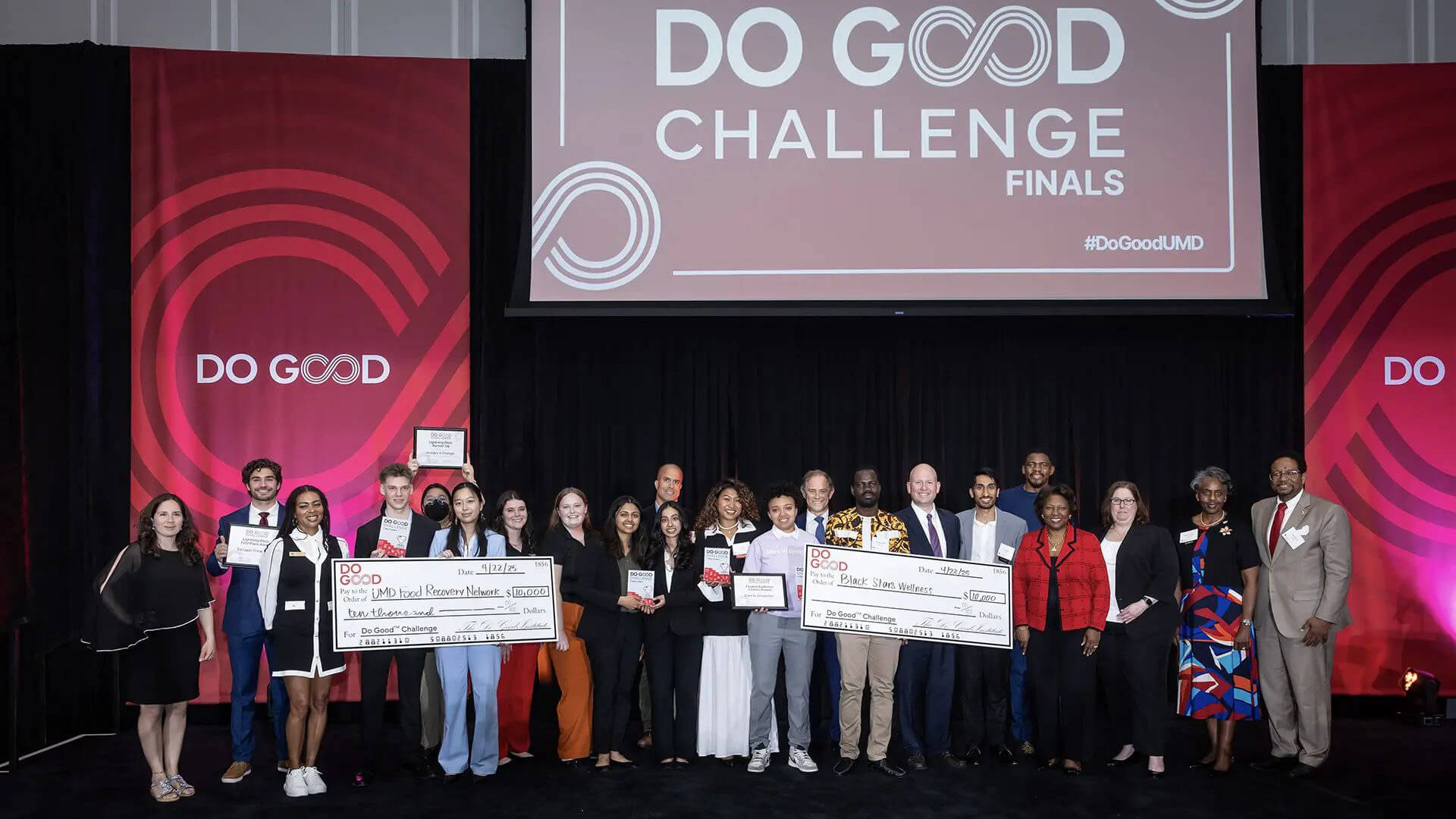
This year’s NASPAA global conference theme was “Making a Difference Globally Through Quality Public Service Education.” Schools from around the world gathered in Flagstaff, AZ from October 8-10 to learn from each other, foster connections in public policy and celebrate public service education.
University of Maryland School of Public Policy’s distinguished group of seven faculty members served as panelists, speakers and chairs across a total of six engaging discussions. Topics ranged from the future of experiential learning and social impact philanthropy to AI’s role in sustainability policy and the evolving landscape of undergraduate public affairs education.
In the session Experiential Learning through Client-Based Capstone Projects, Associate Clinical Professor Meg Brindle, Professor Anand Patwardhan and Associate Clinical Professor James Stillwell discussed the School’s year-long client-based capstone program that connects students with organizations addressing real-world policy challenges. The session outlined best practices for strengthening client relationships and examined case studies from UMD’s program alongside models from Carnegie Mellon, Columbia and Oxford. The discussion focused on how understanding a client’s goals, from policy outcomes to organizational visibility, enhances project impact and student learning. Brindle emphasized the importance of valuing smaller organizations as clients, noting that they often offer mentorship and access to wide professional networks. Stillwell shared his experience completing a capstone project as an MPP-MS student, and highlighted how our Do Good Campus offers experiential learning opportunities as both capstones and as extracurricular opportunities. The session also addressed the shared responsibility among students, faculty and clients in maintaining project quality and institutional reputation.
Brindle also participated in the panel Experiential Learning in a Changing Professional Climate, which explored how experiential, work-integrated and service-learning programs are adapting to rapidly evolving job markets. Her presentation shared the concept of “disruptive intelligence,” encouraging programs to prepare students for structured environments and for moments of instability. She drew on experiences with students whose projects or job placements were disrupted by external events and emphasized that learning adaptability and resilience are critical professional competencies. The panel compared strategies across leading universities, including Harvard Kennedy School, Brown University and American University, for embedding adaptability and reflection into experiential curricula.
The panel Building a Do Good Campus: How to Advance Public Service, Experiential Learning and Social Impact in Higher Education through University-Led Philanthropy included Brindle and Clinical Professor Brandi Slaughter, and was chaired by Stillwell. The session examined how university-led philanthropy and cross-campus partnerships can strengthen public service education by expanding experiential learning and social innovation opportunities.
In the session, Brindle highlighted her Do Good Campus Fund–supported project Roots Africa, which provides intellectual property business training to farmers across Uganda, Liberia and Cameroon. The program helps farmers develop entrepreneurial and business skills to increase revenue and build sustainable agricultural enterprises. She also discussed her involvement with the Women Owned Nilotica Shea (WONS) Cooperative, a group of 200 Ugandan women, many of whom are former child soldiers, who are applying intellectual property strategies to market shea butter products internationally. She emphasized that these initiatives demonstrate how university partnerships and philanthropy can empower communities while advancing the School’s global impact. Slaughter spoke about how her work leading the Karabelle Pizzigati Initiative in Advocacy for Children, Youth and Families cultivates students’ leadership through experiential projects, advocacy days and policy research that engage students directly with lawmakers. Stillwell, in his role as faculty director of the Do Good Campus, detailed the structure of the Do Good Campus Strategic Leadership Council, which convenes senior leaders across the University of Maryland to identify collaboration opportunities and support projects that strengthen civic engagement, philanthropy, experiential learning and social impact on campus and beyond.
Associate Professor Cullen Merritt served as speaker for the session Mid-Level Managers: Navigating the Complexities of Higher Education, which explored the challenges and opportunities faced by middle managers in universities. Merritt discussed how leadership development through faculty service can enhance institutional effectiveness, arguing that service should be recognized as a vital component of academic leadership. Merritt explored how valuing service contributions can help cultivate department heads and program managers who are equipped to manage organizational change in higher education.
Professor Lucy Qiu participated in the panel Leveraging Artificial Intelligence for Public Service: Insights from Sustainability Policy Research and Education, which brought together experts in environmental policy, governance and energy economics to examine how artificial intelligence is reshaping public service education and research. Qiu discussed how tools like large language models and causal machine learning are transforming curriculum design and policy analysis in areas such as climate resilience and energy transitions. She also addressed ethical challenges related to algorithmic bias, data privacy and fairness in AI applications, particularly in energy and environmental datasets that may underrepresent low-income communities. The panel emphasized responsible AI adoption and interdisciplinary collaboration to ensure technological advances support inclusive, evidence-based policymaking.
Lecturer Jennifer Littlefield, co-chair of NASPAA’s Undergraduate Committee, chaired the session Exploring NASPAA Accreditation for Undergraduate Public Affairs Programs. Littlefield, who serves as director of undergraduate studies, contributed to NASPAA’s initial discussions on developing accreditation or recognition standards for undergraduate public affairs degrees, building on its longstanding graduate program accreditation model. The committee reviewed NASPAA’s 2016 undergraduate guidelines to assess their current relevance, identify core competencies for public service education and determine how accreditation could help programs ensure quality, consistency and innovation across institutions.
The School’s participation in the NASPAA global conference reflects its continued leadership in advancing innovative, globally minded approaches to public service education and preparing students to address the complex policy challenges of today’s world.



